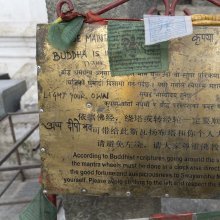Svayambhu, Svayambhū, Swayambhu, Svayam-bhu: 32 definitions
Introduction:
Svayambhu means something in Buddhism, Pali, Hinduism, Sanskrit, Jainism, Prakrit, the history of ancient India, Marathi, biology. If you want to know the exact meaning, history, etymology or English translation of this term then check out the descriptions on this page. Add your comment or reference to a book if you want to contribute to this summary article.
Svayambhu has 32 English definitions available.
Images (photo gallery)
(+21 more images available)
Languages of India and abroad
Sanskrit dictionary
[Deutsch Wörterbuch]
Source: Cologne Digital Sanskrit Dictionaries: Böhtlingk and Roth Grosses Petersburger WörterbuchSvayaṃbhu (स्वयंभु):—[Vopadeva’s Grammatik 26, 168.] m. = bhū Bez. Brahman's [Amarakoṣa 1, 1, 1, 11] [?(nach Śabdakalpadruma] bhū). [Dvirūpakoṣa im Śabdakalpadruma] [Mahābhārata 3, 16632.] [Rāmāyaṇa 1, 13, 48. 2, 30, 27.] [Spr. (II) 6408.] Śiva’s [PAÑCAR. 4, 2, 9.] — Das adj. n. bhu s. unter bhū .
--- OR ---
Svayaṃbhū (स्वयंभू):—Declin. [Vopadeva’s Grammatik 3, 65.]
1) adj. durch sich selbst entstanden, seiend, selbstständig [Vājasaneyisaṃhitā 2, 26. 23, 63. 40, 8.] manyu [Ṛgveda 10, 83, 4.] [Taittirīyasaṃhitā 5, 1, 9, 4.] [Kaṭhopaniṣad 4, 1.] [WEBER, Rāmatāpanīya Upaniṣad 354.] ein Fürst [Aitareyabrāhmaṇa 8, 19.] Wind (vgl. svabhūti) [Suśruta 1, 249, 9.] Śiva [Kathāsaritsāgara 2, 15.] Śiva und Viṣṇu [63, 54.] = antarikṣa [das 1, 3.] von einem höchsten Wesen [Atharvavedasaṃhitā 10, 8, 44. 19, 53, 10.] brahma svayaṃbhu Citat in [Yāska’s Nirukta 2, 11.] [The Śatapathabrāhmaṇa 10, 6, 5, 9. 13, 7, 1, 1. 14, 5, 5, 22. 7, 3, 28.] m. Bez. Brahman's [Hemacandra’s Abhidhānacintāmaṇi 211.] [Halāyudha 1, 7.] [Weber’s Indische Studien 3, 391. 395. 398. 4, 374.] [Manu’s Gesetzbuch 1, 3. 6. 92. 94. 5, 39. 8, 413. 9, 138.] [Mahābhārata 3, 1152. 12191. 13, 4377. 4380.] [Harivaṃśa 37. 12317. 14075. 14081. 14119.] [Rāmāyaṇa 1, 16, 1. 2, 110, 3.] [Rāmāyaṇa] [Gorresio 2, 30, 29. 3, 36, 20. 4, 44, 120.] [Suśruta 1, 1, 17. 6, 5.] [Spr. (II) 7013.] [Varāhamihira’s Bṛhajjātaka S. 43, 42. 48, 2.] [Rājataraṅgiṇī 1, 34. 3,] [?455.Viṣṇupurāṇa 3, 3, 11. Mārkāṇḍeyapurāṇa 46, 17. 107, 5. Bhāgavatapurāṇa 3, 8, 15. 12, 28. 6, 1, 40. 3, 20. 8, 3, 3. 9, 1, 9. als] Vyāsa [Oxforder Handschriften 80,a,10.] —
2) m. ein Pratyekabuddha [Trikāṇḍaśeṣa 1, 1, 13.] Bez. Ādibuddha’s und eines Buddha überh. [BURNOUF,] [?Intr. 222. Lot. de Lassen’s Anthologie b. l. 336. WILSON, Sel. Works 2, 11. 15. 27. 32. Rgva tch’er rol pa ed. Calc. 341, 1. 362, 4. 5. Rājataraṅgiṇī 2, 136.] ein Arhant bei den Jaina [Hemacandra’s Abhidhānacintāmaṇi 24.] — Hiervon
3) adj. zu Buddha in Beziehung stehend: kaśmīreṣu svayaṃbhūni gatvā kṣetrāṇi pūjaya [Kathāsaritsāgara 51, 45.] —
4) m. Nomen proprium des 3ten schwarzen Vāsudeva bei den Jaina [Hemacandra’s Abhidhānacintāmaṇi 695.] —
5) m. die Zeit [Śabdaratnāvalī im Śabdakalpadruma] der Liebesgott [ŚABDĀRTHAK.] bei [WILSON]; = māṣaparṇī und liṅginī [Rājanirghaṇṭa im Śabdakalpadruma] — Vgl. svāyaṃbhuva .
Sanskrit, also spelled संस्कृतम् (saṃskṛtam), is an ancient language of India commonly seen as the grandmother of the Indo-European language family (even English!). Closely allied with Prakrit and Pali, Sanskrit is more exhaustive in both grammar and terms and has the most extensive collection of literature in the world, greatly surpassing its sister-languages Greek and Latin.
See also (Relevant definitions)
Partial matches: Swayam, Svayam, Bhu, Shvaya.
Starts with (+5): Svayambhucaitanya, Svayambhuchandas, Svayambhuchhandas, Svayambhudeva, Svayambhujnana, Svayambhukshetra, Svayambhukshetramahatmya, Svayambhulinga, Svayambhulingasambhuta, Svayambhumatrikatantra, Svayambhumurti, Svayambhupurana, Svayambhuramana, Svayambhuramanadvipa, Svayambhuramanasamudra, Svayambhusukha, Svayambhusvara, Svayambhuta, Svayambhuva, Svayambhuva-Sutra-Samgraha.
Ends with: Covisisvayambhu, Jyotirupasvayambhu.
Full-text (+556): Svayambhuva, Ratnalingeshvara, Svayambhupurana, Svayambhukshetramahatmya, Svayambhulinga, Svayambhucaitanya, Svayambhumatrikatantra, Jyotirupasvayambhu, Svayambhulingasambhuta, Svayampu, Coyampu, Svabhu, Uttanapada, Sthavaralinga, Devahuti, Bahudhatmaka, Bhu, Cuvayampuvamanu, Shikha, Antakarin.
Relevant text
Search found 85 books and stories containing Svayambhu, Svaya-mbhu, Svaya-mbhū, Svayam-bhu, Svayam-bhū, Svayambhū, Svayaṃbhū, Svayaṃbhu, Svāyambhū, Swayam-bhu, Swayambhu; (plurals include: Svayambhus, mbhus, mbhūs, bhus, bhūs, Svayambhūs, Svayaṃbhūs, Svayaṃbhus, Svāyambhūs, Swayambhus). You can also click to the full overview containing English textual excerpts. Below are direct links for the most relevant articles:
Shat-cakra-nirupana (the six bodily centres) (by Arthur Avalon)
Brihad Bhagavatamrita (commentary) (by Śrī Śrīmad Bhaktivedānta Nārāyana Gosvāmī Mahārāja)
Verse 2.2.125 < [Chapter 2 - Jñāna (knowledge)]
Verse 1.2.46-47 < [Chapter 2 - Divya (the celestial plane)]
Trishashti Shalaka Purusha Caritra (by Helen M. Johnson)
Part 15: Vimala’s samavasaraṇa < [Chapter III - Vimalanāthacaritra]
Part 19: Death of Svayambhū < [Chapter III - Vimalanāthacaritra]
Part 11: Birth of Svayambhū < [Chapter III - Vimalanāthacaritra]
The Agni Purana (by N. Gangadharan)
Chapter 359 - Adding the kṛt affixes (primary affixes added to verbs)
Chapter 17 - Description of Creation
Naishadha-charita of Shriharsha (by Krishna Kanta Handiqui)
Introduction to Narahari’s commentary < [Introduction]
Garga Samhita (English) (by Danavir Goswami)
Verse 6.3.14 < [Chapter 3 - Lord Balarāma’s Wedding]
Verse 6.3.13 < [Chapter 3 - Lord Balarāma’s Wedding]
Verse 8.13.74 < [Chapter 13 - A Thousand Names of Lord Balarāma]
Related products






